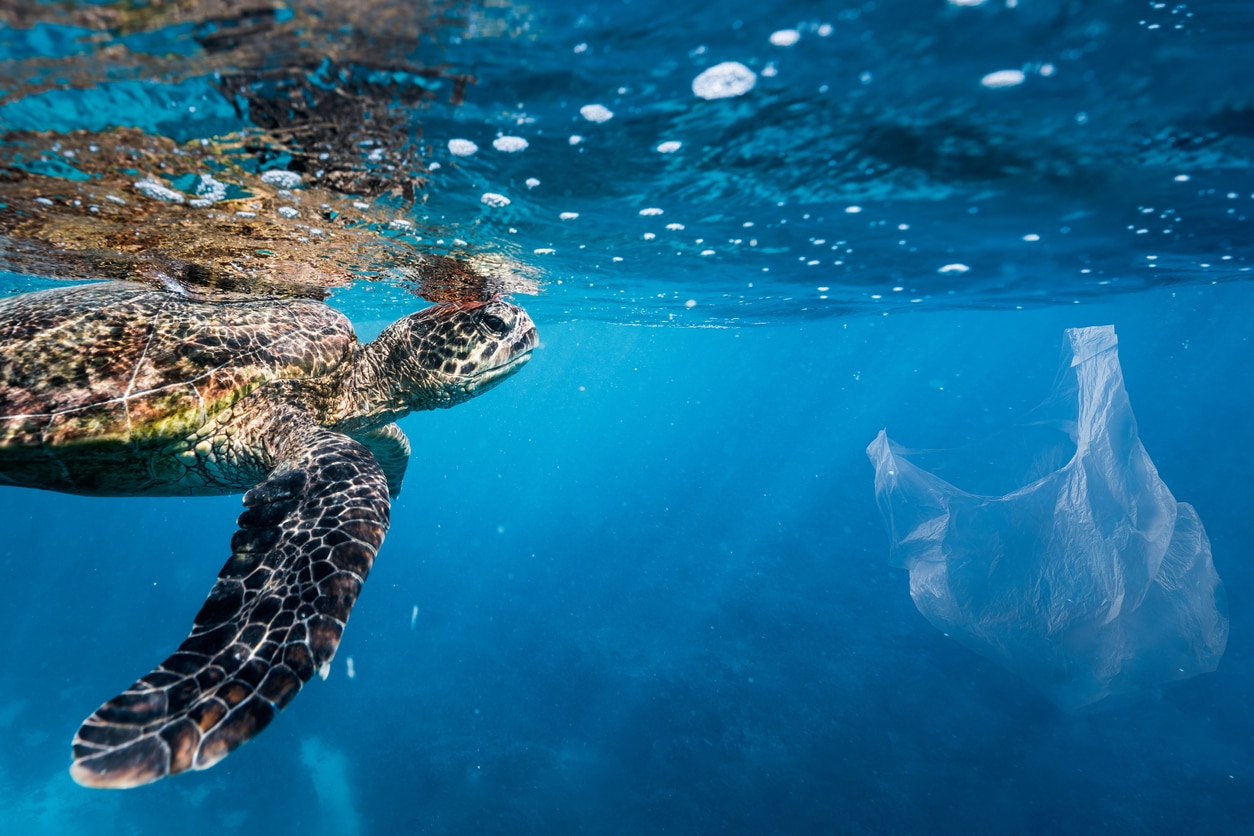
New Study Reveals Effects of Plastic Pollution on Marine Life
A new study suggests the effects of plastic pollution in oceans go beyond mountains of plastic products on ocean floors and fish ingesting microplastics. Plastic pollution also has the potential to change the ocean’s makeup through ocean acidification, which could affect entire ecosystems on the planet. In this article, we’ll discuss what the study found, as well as actions you can take to make a difference.
Understanding Ocean Acidification
Multiple studies have shown the effects of plastic pollution in oceans and its effects on marine life. Some have predicted, by 2050, there could be more plastic particles than fish in the ocean. Scientists continue to reveal the more profound effects of plastic pollution on marine life and ecosystems.
Christina Romero-Castillo and her team conducted a series of lab experiments to test how plastic reacts to sunlight. They put new plastics and old plastics in separate glass bottles filled with seawater and then exposed the plastic-filled bottles to simulated sunlight from ultraviolet light.
They found the old, degraded plastics release chemicals such as organic acids into the water when they interact with sunlight. These organic acids lower seawater’s pH, which increases acidity levels.
Considering the oceans absorb almost 30% of carbon emissions from human activities, adding acidity levels from sun-degraded plastics presents another challenge for marine life and ecosystems.
What Are Acidification’s Effects on Marine Life?
You’ve probably seen studies about how plastics release toxic contaminants when they have been in seawater for a long time. When fish and other marine life eat plastics or microplastics, contaminants enter their digestive systems.
When you add ocean acidification to that, low pH levels affect the survival of corals, plankton, urchins and oysters by disrupting their ability to build skeletons and shells from calcium carbonate. When these calcifying organisms become weak, it affects other marine life that depends on them for habitat and food.
In addition, ocean acidification and warming can change marine microbial community makeup. This can cause an increase in the toxicity of harmful algae, which deteriorates marine biodiversity and disrupts ocean food webs.
How Does Acidification Affect Human Life?
If ocean acidification reaches certain levels, it could disrupt multiple natural functions and ecosystems on the earth which are tied to human life.
Multiple studies have shown an alarming amount of microplastics have found their way into seafood, water and salt.
When plastics break down in sunlight, the chemicals released cause various health issues by releasing toxic chemicals into your body. This may lead to issues with your digestive system, inflammation and oxidative stress.
Although the big-picture solution is for plastic production to halt entirely, protecting yourself from the effects of ingesting microplastics is more important than ever.
To counter the negative health effects of microplastics, it is recommended you take vitamins. For example, Magnesium fights off inflammation and Vitamin E protects from free radicals, which are closely linked to oxidative stress.
In addition to using a plastic-free water bottle, invest in a water filter that’s powerful enough to remove microplastics. Carbon Block faucet and distillation filters can remove 100% of known microplastics, while reverse osmosis filters can filter down to 0.001 microns.
You can also ensure you eat healthy foods full of antioxidants like kale, broccoli, cabbage and anti-inflammatory foods like beetroot and ginger.
Are There Any Bigger Solutions?
Considering it takes up to 500 years for plastic to decompose, we have gone far beyond urgency when it comes to reducing plastic waste. The old plastics filling up oceans and landfills continue to produce carbon dioxide and organic acids affecting marine life.
The United Nations has been hosting ongoing talks for the plastics treaty, a legally binding global agreement that will address the full life-cycle of plastic. The latest round of talks happened in Nairobi, although delegates have yet to agree on the treaty. The talks will continue in April 2024 and hopefully end in a plastics treaty that will push the reduction of plastic pollution to 40 tons, as opposed to the predicted 227 tons without action.
Over the past few years, French company, Carbios, has been recycling plastic using a bacterial enzyme that processes plastic waste into liquid ethylene glycol and terephthalic acid, which can produce fresh plastic. Carbos’ system currently produces 51% less emissions than it takes to make new plastic from oil. Although it still produces emissions, this presents an opportunity for a cyclic system which stops the production of plastic from natural resources altogether.
What Can You Do To Reduce Plastic Pollution?
A helpful place to start is with a trash audit. Track what you throw away for a week or two to see where you can replace single-use items with reusable ones. For example, you might use a lot of Ziploc bags and cling film to store food you buy in bulk. You could replace those with beeswax wraps.
Here are a few more actionable points:
- Sign petitions to reduce plastic packaging for online shopping deliveries.
- Recycle properly, emptying containers of food and liquids.
- Participate in town and beach cleanups.
- Use alternative packaging for your small business, like paper or biodegradable material.
- Replace single-use items, like straws and water bottles, with silicone or metal versions.
- Replace your favorite chewing gum with organic chewing gum.
- Buy glass or steel storage containers, when it’s time to replace what you already have.
- Choose the “no cutlery” option for food delivery or bring your own container to restaurants for leftovers.
- Replace teabags with loose-leaf tea.
- Buy from zero-waste brands and local markets. You can get plastic-free makeup, skincare products and cleaning products.
- Encourage family, friends and co-workers to recycle and practice a sustainable lifestyle.
While urgent action from governments and companies to reduce plastic production is necessary, you also have a part to play. When you swap out plastic products for long-lasting solutions, you reduce the demand for plastic.
The Urgent Need for Reducing Plastic Pollution
Romero-Castillo’s findings exemplify numerous studies highlighting the importance of reducing plastic pollution. The planet has reached a significant turning point so urgent action is required. Depending on the outcome of the plastics treaty, you could see a drastic reduction in plastic use or continued efforts by environmentalists and activists to reduce plastic production.



Post a comment